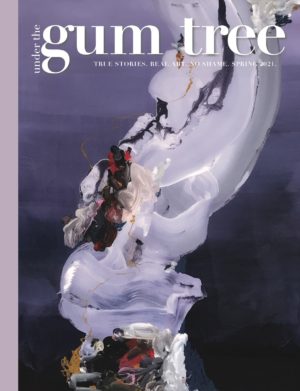Melanie J. Malinowski

How do you prompt yourself to think? Do you rely more on imagination or memory?
I am a fiction writer, so imagining characters and worlds and scenes and dialogue naturally positions itself as part of my writing process. When I began writing Creative Nonfiction, I accessed my already sharply honed ability to “imagine” and yoked that to the glory of my compendious, precise memory. Honestly, as I created this essay, I meditatively drew myself back to that day in my fourteenth year, felt the warm linoleum of the kitchen floor under my feet, tasted the sticky Bonne Belle Strawberry Lip Smackers on my mouth. I love this gift of mine, the ability to go back, occupy lost time, and redraw it in language.
The story centers around a particular scene wherein the characters experience a moment of self-growth and recognition. How do you feel the two versions of self-interacting with each other before, during, and after the piece?
Aging has been a kick in the teeth for me! In my soul, I feel fifteen, sixteen, eighteen, but I look at myself, and I see, well, fifty-five! What? My now sixteen-year-old daughter resembles me so much that, at times, I catch her out of the corner of my eye and think she is me.
Tom Petty, in a way, and my recollections of the two concerts, serve as a crucible for the emergence of the “holy shit” epiphany, a natural and fortunate alignment of the “selves.” And Tom himself, his recognition that, yea, a lot of “older” folk attended his concerts, drew me closer to my now-aged self, along with the quick relief of the twenty-year-old beauty in front of us. The gorgeous thing about being allowed to grow old is that the Melanie I am now gets to carry all the other “mes” with her: fourteen-year-old innocent me; twenty-five-year old heartbroken me; thirty-eight-year-old pregnant me. They all march within me, help me to carry on joyously in the knowledge that they all formed and continue to shape my ever evolving and changing self.
Speak a little bit more to the interaction between age and nostalgia in your piece? Do you find yourself valuing memories from your youth, specifically the concert, more as you reflect on them more? How have you felt your attitude towards other experiencing similar moments change as your opinion of your own memories do? How does nostalgia interact with music, specifically the differences in how the sound of music has changed from then to now?
Music—particularly classic rock—defined my childhood, adolescence, adulthood. My father was a musician and music teacher, and he knew good music! Once, when I was young, I can remember sitting in the front seat of the car with him and him telling me that the song on the radio was approximately 3 minutes long, about how long it would take us to get home, and that this was a good way to measure time, by the length of the song on the radio. I have held on to that little lesson.
In grad school in the ’80s, living in a junky apartment in Albuquerque with the Sandia Mountains in my view, I would listen to Bob Dylan cassettes over and over on my pink tape player. I did not have a tv or a car, and those songs soothed me. My fifteen-year-old daughter is named Echo after Bob Dylan’s high school sweetheart. My home’s walls teem with photos of Steven Tyler, my car license plate is Dream On, and Steven Tyler once signed my belly. Songs impact me the way literature does, with an ache in my heart to live the moment of story: to be the American Girl on the balcony.

